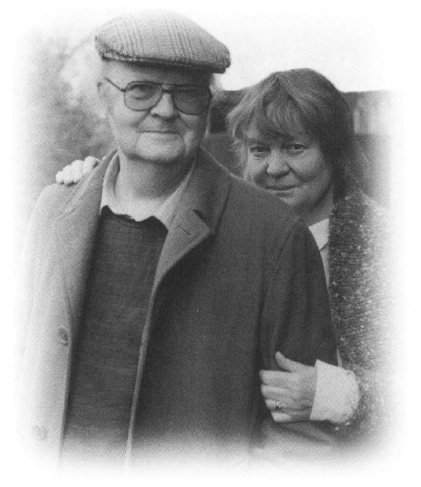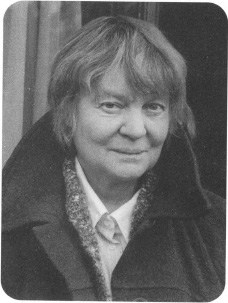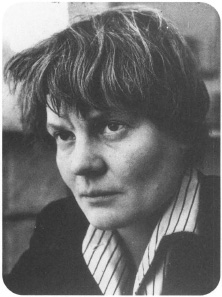Iris and Her Friends

Previous Works by John Bayley
Elegy for Iris
The Red Hat: A Novel
Tolstoy and the Novel
Shakespeare and Tragedy
The Short Story: Henry James to Elizabeth Bowen


Copyright 2000 by John Bayley
All rights reserved
First published as a Norton paperback 2000
Photographs on pages iv, vii, and 147 Miriam Berkley. Reprinted with permission.
For information about permission to reproduce selections from this book, write to Permissions, W. W. Norton & Company, Inc., 500 Fifth Avenue, New York, NY 10110
Book design by Ellen R. Sasahara
Library of Congress Cataloging-in-Publication Data
Bayley, John, 1925
Iris and her friends: a memoir of memory and desire / John Bayley.
p. cm.
ISBN 0-393-04856-X
1. Murdoch, IrisMarriage. 2. Bayley, John, 1925Marriage. 3. Women novelists, English20th century Biography. 4. Women philosophersGreat Britain Biography. 5. College teachersGreat Britain Biography. 6. Married peopleGreat Britain Biography. 7. Alzheimers diseasePatientsBiography. 8. CriticsGreat BritainBiography. 9. University of OxfordBiography. I. Title.
PR6063.U7Z584 1999
823914
ISBN 978-0-393-24436-6 (e-book)
W. W. Norton & Company, Inc., 500 Fifth Avenue, New York, N.Y. 10110
www.wwnorton.com
W. W. Norton & Company Ltd., 10 Coptic Street, London WC1A 1PU
Contents



I can hardly believe its all over. At the end, it happened so quickly. My diary says that Iris and I were together, struggling along in the particular way that an Alzheimers patient and caregiver do, less than three weeks ago.
And then between one day and the next, it became all but impossible to get her to eat and drink. I coaxed her in every way I could think of, but she seemed abruptly to have given up being a good, if sometimes difficult, child, and became a sadly determined adult. Politely and smilingly, she declined to open her mouth to have a teaspoon or the edge of a cup put in, as if she had decided it was no longer worthwhile.
With the mind virtually gone, can the body take over the power of decision? It seemed that way. What Pascal said of the heart may be true of the body, too. Like the heart, it has its own reasons, which reason knows nothing about. If no one interferes, it knows how to do the right thing at the right moment.
And that is surely comforting. For whom? For the onlooker, of course. The caregiver. The patient is already far off. In a dark country, where she has her own ways of knowing things. And seeing things. And doing things.
It was less than three weeks ago that I made these observations, but all year things had been growing worse, and compensations had mounted up, inevitably so, and I had been looking out for the next stage in the steady but unpredictable advance of Alzheimers.
Yet nothing seems to change in my diary. Waiting. Working and watching. Taking short and even shorter views.



O ne night some months ago, during the fall of 1998, it must have been, I had woken up suddenly with the feeling that something was wrong. I switched on my pencil flashlight and found it was two oclock. Id been asleep two hours. I felt bemused but, at the same time, intensely wakeful. For there was a subdued noise somewhere in the house. The sound of voices.
Was it burglars? But why should burglars be talking? Did they think the house was empty? I reached over to the other side of the bed. There was nothing there. Iris had gone.
Shes always such a good sleeper. That was my first thought. In its earlier stages, Alzheimers disease actually seems to confer minor physical compensations. The sufferers may sleep soundly, look well, never get a cold. Iris liked to go to bed early and slept almost without stirring until eight or nine in the morning. So what had gone wrong?
And to whom was she talking? Surprising how eerie her voice sounded, in the silence of the night, coming up muffled from somewhere downstairs. No words to recognise. There wouldnt, in any case, be intelligible words. No doubt thats why it sounded like two or three people conversing together, voices merging.
Who were these new friends of Iris, with whom she was chatting as if they were already old friends?
My heart sank inside me as I realised that the disease must have entered another phase. Sometimes in the early morning, Iris got up to go to the loo. As I might do, as any one might do. But wandering round the house and chatting to herself at two in the morning was a new development.
For a moment, I thought I heard the voice of Macbeth, the most terrifyingly intimate of all Shakespeares tragic characters. Methought I heard a voice cry Sleep no more! One is apt to get such dramatic visions of despair into ones head at two in the morning.
It passed. Daylight came. A bit of sleep for both of us. And a little later that morning, I had a visitation. Perhaps it was one of Iriss nocturnal friends. Or perhaps it was Dr. Alzheimers very particular, very special intimate, who in time would become the friend of us both.
Dr. Alois Alzheimer, a native of Alsace, wrote a treatise in 1907 on the disease or condition that is named after him. He had observed it in patients who were in their fifties, as well as in older people, and he had concluded that this type of dementia differed from more generalised aspects of senility. The condition was also marked by a regular progression, which might be either rapid or slow; but he found no cases of remission or recovery.
A bleak outlook, which left not much room for lightness of heart in the sufferer, or for those who attended the sufferer? Not necessarily. There may be rewards and alleviations on the way, for all parties. As well as anxiety in the patient, there may be a kind of merciful indifference, even lightness of heart, a shrugging off of responsibility for the things most of us feel we have to do every daywashing, dressing, keeping up appearances.
Even the good doctors name, ill-omened as it might seem, can possess a droll freedom of association. Remove it into other circumstances and it could signify other and more cheerful things, more comical things even. The Alzheimer, a potent vintage racing car that in its time even challenged the Bugatti? A gambling club, a select restaurant? Or when a guest praised the pt, a youthful hostess might candidly admit that she had got it at Alzheimers.
Next page

















